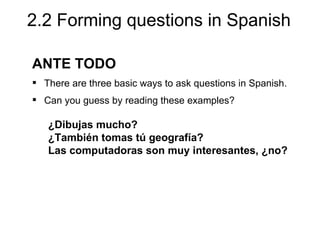
Formar preguntas en español
- 1. 2.2 Forming questions in Spanish ANTE TODO There are three basic ways to ask questions in Spanish. Can you guess by reading these examples? ¿Dibujas mucho? ¿También tomas tú geografía? Las computadoras son muy interesantes, ¿no?
- 2. 2.2 Forming questions in Spanish • One way to form a question is to raise the pitch of your voice at the end of a declarative sentence. • When writing any question in Spanish, be sure to use an upside down question mark (¿) at the beginning and a regular question mark (?) at the end of the sentence. Statement Question Ustedes trabajan los sábados. ¿Ustedes trabajan los sábados? You work on Saturdays. Do you work on Saturdays? Miguel busca un mapa. ¿Miguel busca un mapa? Miguel is looking for a map. Is Miguel looking for a map?
- 3. 2.2 Forming questions in Spanish As in English, you can form a question by inverting the order of the subject and the verb of a declarative statement. The subject may even be placed at the end of the sentence. Statement Question SUBJECT VERB VERB SUBJECT Ustedes trabajan los sábados. ¿Trabajan ustedes los sábados? You work on Saturdays. Do you work on Saturdays? SUBJECT VERB VERB SUBJECT Carlota regresa a las seis. ¿Regresa a las seis Carlota? Carlota returns at six. Does Carlota return at six?
- 4. 2.2 Forming questions in Spanish Questions can also be formed by adding the tags ¿no? or ¿verdad? at the end of a statement. Statement Question Ustedes trabajan los sábados. Ustedes trabajan los sábados ¿verdad? You work on Saturdays. You work on Saturdays, right? Carlota regresa a las seis. Carlota regresa a las seis ¿no? Carlota returns at six. Carlota returns at six, doesn't she?
- 5. 2.2 Forming questions in Spanish Question words ¿Cómo? How? ¿De dónde? From where? ¿Cuál? Which? ¿Por qué? Why? ¿Cuáles? Which ones? ¿Cuánto/a? How much? ¿Cuándo? When? ¿Cuántos/as? How many? ¿Qué? What? ; Which? ¿Quién? Who? ¿Dónde? Where? ¿Quiénes? Who (plural)? ¿Adónde? Where (to)?
- 6. 2.2 Forming questions in Spanish To ask a question that requires more than a simple yes or no answer, an interrogative word is used. ¿Cuál de ellos estudia en la biblioteca? Which of them studies in the library? ¿Adónde caminamos? Where are we walking? ¿Cuándo descansan ustedes? When do you rest? ¿De dónde son Álex y Javier? Where are Alex and Javier from? continues...
- 7. 2.2 Forming questions in Spanish ¿Cuántos estudiantes hablan español? How many students speak Spanish? ¿Por qué necesitas hablar con ella? Why do you need to talk to her? ¿Dónde trabaja Ricardo? Where does Ricardo work? ¿Quién enseña la clase de arte? Who teaches the art class? ¿Qué clases tomas? What classes are you taking? ¿Cuánta tarea hay? How much homework is there?
- 8. 2.2 Forming questions in Spanish When pronouncing this type of question, the pitch of your voice falls at the end of the sentence. ¿Cómo llegas a clase? ¿Por qué necesitas estudiar? How do you get to class? Why do you need to study? In Spanish no can mean both no and not. Therefore, when answering a yes/no question in the negative, you need to use no twice. ¿Caminan a la universidad? No, no caminamos a la universidad. Do you walk to the university? No, we do not walk to the university.
- 9. 2.2 Forming questions in Spanish ¡INTÉNTALO! Make questions out of these statements. Use intonation in column 1 and the tag ¿no? in column 2. Statement Intonation Tag questions 1. Hablas inglés. ¿Hablas inglés? Hablas inglés, ¿no? 2. Trabajamos mañana. ______________ ______________ 3. Ustedes desean bailar. ______________ ______________ 4. Raúl estudia mucho. ______________ ______________ 5. Enseño a las nueve. ______________ ______________ 6. Luz mira la televisión. ______________ ______________ 7. Los chicos descansan. ______________ ______________ 8. Él prepara la prueba. ______________ ______________
- 10. 2.2 Forming questions in Spanish Answer key-page 1 Statement Intonation Tag questions 1. Hablas inglés. ¿Hablas inglés? Hablas inglés, ¿no? 2. Trabajamos mañana. ¿Trabajamos Trabajamos mañana? mañana, ¿no? 3. Ustedes desean bailar. ¿Desean Ustedes Ustedes desean bailar? bailar, ¿no? 4. Raúl estudia mucho. ¿Estudia mucho Raúl estudia mucho, Raúl? ¿no? 5. Enseño a las nueve. Enseño a las Enseño a las nueve, nueve? ¿no? (continued…)
- 11. 2.2 Forming questions in Spanish Answer key-page 2 Statement Intonation Tag questions 6. Luz mira la televisión. ¿Mira la television Luz mira la Luz? televisión, ¿no? 7. Los chicos descansan. ¿Descansan los Los chicos chicos? descansan, ¿no? 8. Él prepara la prueba. ¿Prepara la Él prepara la prueba prueba él? ¿no?